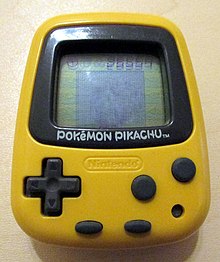Pokémon Pikachu
 | |
| Also known as | Pocket Pikachu (ポケットピカチュウ) |
|---|---|
| Manufacturer | Nintendo |
| Type | Digital pet, exercise toy |
| Release date |
|
| Introductory price | |
| Display | LCD |
| Connectivity | Infrared port (Pokémon Pikachu 2 GS, Pocket Pikachu Color) |
| Power | CR2032 battery[3] |
| Dimensions |
|
| Mass | 40 grams[3] |
| Related articles | Pokéwalker |
| Website | Official website(in Japanese) |
Pokémon Pikachu, also known as Pocket Pikachu (ポケットピカチュウ) in Japan, is a limited series of two portable Pokémon digital pets (similar to Tamagotchi) featuring the famous yellow electric-type Pokémon, Pikachu. Released on March 27, 1998, in Japan (November 2, 1998, in North America).[1]
Gameplay[]
The first release, a yellow unit resembling a Game Boy, features a black and white LCD screen used to display animations of Pikachu's activities. Gameplay differs slightly from other portable virtual pets in that Pikachu does not need to be fed, watered, or cleaned up after. Instead, the Pokémon Pikachu unit can be strapped to a belt and used as a pedometer. With every twenty steps it counts, the Pokémon Pikachu credits its user with one watt, a virtual currency used to buy Pikachu presents. Additional activities become available as the player spends more time with their virtual Pikachu. If neglected, Pikachu will express anger and eventually refuse to recognize the player.[4][5]

The second release, Pokémon Pikachu 2 GS, is available in clear and silver casing with a color display featuring more animations.[6] It features an infrared port for interacting with Pokémon Gold, Silver, and Crystal via the Mystery Gift option, which utilizes the Game Boy Color's built-in infrared communication port. This allows players to trade watts for items in the Game Boy games. Although there is a limitation on how much the Mystery Gift mode can be used between Game Boy cartridges, Pokémon Pikachu's only limit is that of available watts (and it is region locked). Watts can also be sent to other Pokémon Pikachu 2 units.[7]
Other models[]
Pokémon and its character Pikachu are not the only media franchises that are used by this Nintendo-made device. Sakura Taisen, a media franchise of SEGA and licensed by RED Entertainment released a virtual-pet with pedometer, in the same style as the 2 GS, called Pocket Sakura (ポケットサクラ) and Sakura Taisen GB, developed by Jupiter. Sega could not publish either because, at the time, they and Nintendo were rivals, so publishing was handled by Media Factory.[8]
Similarly, Sanrio, responsible for the Hello Kitty franchise, licensed to Nintendo the development of the Pocket Hello Kitty. This featured a similar design to the first Pokémon Pikachu, with a game based on Hello Kitty and her friends, available in a pink-colored case.
Pokéwalker[]
A device similar to the Pokémon Pikachu, called the Pokéwalker, comes packaged with Pokémon HeartGold and SoulSilver and communicates directly with the game cards via infrared. It allows the player to transfer one Pokémon at a time from their HeartGold or SoulSilver. The user is able to catch Pokémon and find items by spending watts.[9]
References[]
- ^ Jump up to: a b "Take a Walk on the Pokémon Side With Pokémon Pikachu™" (Press release). Nintendo. November 5, 1998. Archived from the original on February 18, 1999. Retrieved May 31, 2021.
- ^ "Pocket Pikachu" (in Japanese). Retrieved May 31, 2021.
- ^ Jump up to: a b c "User Guide and Tech Specs" (in Japanese). Retrieved May 31, 2021.
- ^ "Pokémon Pikachu (original)". Nintendo. Archived from the original on April 1, 2016. Retrieved May 31, 2021.
- ^ "Gameplay Screenshots" (in Japanese). Retrieved May 31, 2021.
- ^ "Pokemon Pikachu 2 GS". IGN Cheats. Archived from the original on January 3, 2007. Retrieved May 31, 2021.
- ^ "Pokémon Pikachu 2 GS". Nintendo. Archived from the original on June 13, 2016. Retrieved May 31, 2021.
- ^ "Pocket Sakura". Jupiter Corporation. Archived from the original on August 4, 2020. Retrieved May 31, 2021.
- ^ JC Fletcher (June 8, 2009). "Pokemon Gold/Silver remakes let you train Pokémon by walking". Joystiq. Archived from the original on June 11, 2009. Retrieved May 31, 2021.
External links[]
- 1998 video games
- Handheld electronic games
- Video games about mice and rats
- Video games developed in Japan
- Virtual pets
- Pokémon spin-off games
